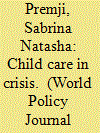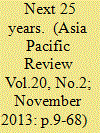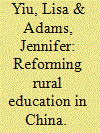|
|
|
Sort Order |
|
|
|
Items / Page
|
|
|
|
|
|
|
| Srl | Item |
| 1 |
ID:
133464


|
|
|
|
|
| Publication |
2014.
|
| Summary/Abstract |
In the winding alleyways of Mlolongo, one of Kenya's densest slums, heavy rainfalls from the previous night carpet the road with mud and animal waste, making both nearly impossible to avoid. Visitors approach and remove their shoes at the door to Mama Agnes' home, a mud shack, then step into a room where the air is pungent with the smell of urine and feces. In the darkness, one misstep and a visitor stumbles upon an infant, who seems unshaken by the accidental nudge. A few steps further lie two dozen more infants, none older than 18 months-some sitting on a broken couch, many lying on the concrete ground. Though all awake, their perfect little bodies remain still, only their bellies rising with each breath. In an eight-foot square space, there are at least 25 babies, and the only sound-silence.
|
|
|
|
|
|
|
|
|
|
|
|
|
|
|
|
| 2 |
ID:
135002


|
|
|
|
|
| Summary/Abstract |
This paper focuses on the ponoh/pondok Muslim schools of the south of Thailand. These schools, which are traditional institutions of religious learning and places of religious piety, have experienced conflict and contestations throughout the twentieth century. Pondok have been pulled by different modernizing forces including separatist violence. The paper concludes that the contestations and negotiations with the Thai government are about the development of the local Malay people's modern civic identity within Thailand. It suggests that the introduction of a secular curriculum has had (and still has) its benefits for empowering the Malay-speaking population by supplying them with the cultural tools to contest and civically negotiate their position, culture and heritage within the Kingdom. The paper also provides a history of these schools and their political relationship to the Thai government's policies and to separatist organizations, as well as an update of events relating to the schools during the recent period of separatist and counter-separatist activities.
|
|
|
|
|
|
|
|
|
|
|
|
|
|
|
|
| 3 |
ID:
128253


|
|
|
|
|
| Publication |
2013.
|
| Summary/Abstract |
Taking the opportunity of the twenty-fifth year anniversary, these proposals were compiled to present a view of the issues that must be addressed together with a vision of how Japanese people will live their lives in a vibrant Japan that is active on the world stage in 25 years' time. Here the effort has been to formulate an ideal national vision and to endeavor to achieve this vision without getting caught up in constraints of the current reality.
Included herein are the Charter and individual proposals. The Charter describes a vision of the country of Japan and the Japanese people. The Charter was written to clearly express a vision for Japan and the Japanese people. Furthermore, the individual proposals focus on 10 issues confronting contemporary Japan that need to be overcome. Specifically, Reverse Declining Birth Rate, Seniors Contributing to Society, Education Policy, Labor Policy, Science and Technology Policy, Energy Policy, Diplomacy and Security Policy, Fiscal/Social Security Policy, Political Reform, and Good Governance of an Aging Society: A Master Plan are the issues addressed in these proposals.
The past cannot be changed, but with a sense of purpose and action, the future can be transformed. It is we ourselves who build and create the future. In 25 years hence, as the Japanese people live in safety and comfort, filled with happiness, Japan can contribute to the international community by actively contributing to peace and prosperity around the world. That is the role that we hope Japan fulfills.
|
|
|
|
|
|
|
|
|
|
|
|
|
|
|
|
| 4 |
ID:
124896


|
|
|
|
|
| Publication |
2013.
|
| Summary/Abstract |
The Chinese state's commitment to improve teaching quality in rural regions is a key component of national efforts to close the rural-urban education gap. In this paper, we investigate an understudied but critical dimension of quality teaching: teacher expectations. We employ longitudinal data gathered in Gansu Province in 2000 and 2007 to first examine whether teacher expectations for rural youth are conditioned by students' social origin and teacher background characteristics. Next, we determine the predictive accuracy of their expectations. Our results highlight the ways in which teacher expectations condition the sorting of rural children among different schooling tracks with distinct life trajectories. Significantly, teachers are more likely to hold lower expectations for students from disadvantaged backgrounds. In addition, non-local teachers hold lower expectations for rural children compared to local teachers. Finally, a low percentage of teachers expect students to enrol in post-compulsory vocational education. We consider the implications of these results for both educational policy and social inequality.
|
|
|
|
|
|
|
|
|
|
|
|
|
|
|
|
|
|
|
|
|